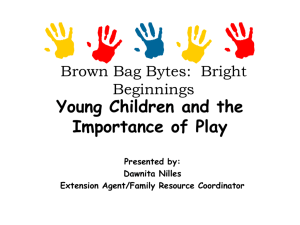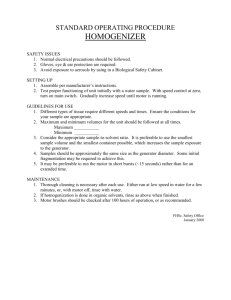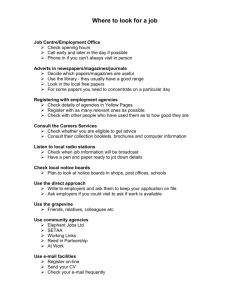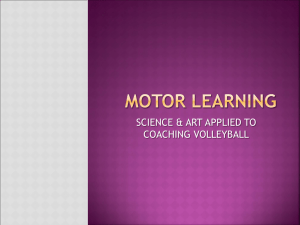Motor control, motor Learning and recovery of function
advertisement
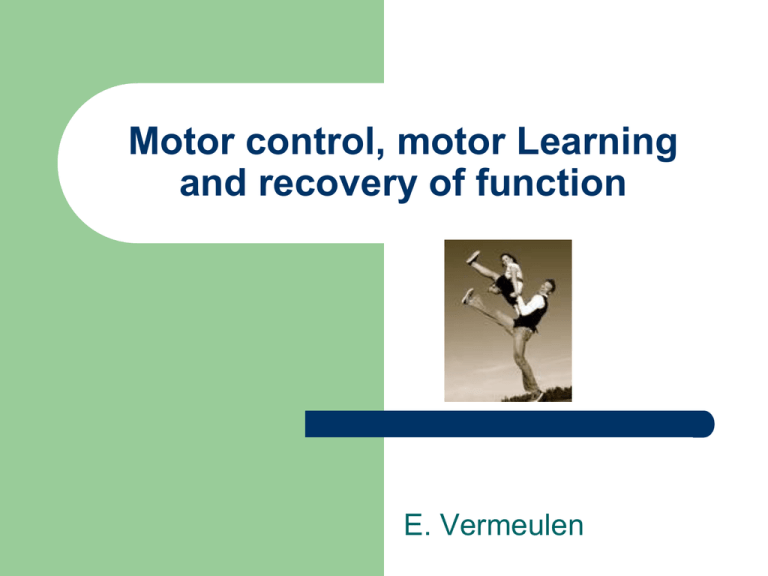
Motor control, motor Learning and recovery of function E. Vermeulen Learning objectives Define motor control and discuss its relevance to clinical treatment of patients with movement pathology Define motor learning; discuss the similarities and differences between learning, performance and recovery of function. Compare and contrast implicit and explicit forms of learning and give an example of each Learning objectives continued Discuss intrinsic versus extrinsic feedback; give examples of each and discuss their importance in teaching motor learning Discuss factors that have an impact on the structure of practice and describe their effect on performance versus learning. Define recovery of function, describe the differences between recovery and compensation. What is motor control? - The study of the nature and cause of movement. 2 Aspects: Stabilizing of the body in space (motor control as it applies to postural and balance control). Moving the body in space (motor control as it applies to movement) THUS: THE CONTROL OF MOVEMENT AND POSTURE. Case study Mrs Phoebe R. hemiplegic, stroke 5/52 ago. stand walk and feed herself ‘spontaneous recovery’/ therapy? maintain after rehab? Motor learning vs. motor control Motor Learning: The study of the acquisition and or modification of movement. Motor control: focuses on understanding the control of movement already acquired. Motor learning: focuses on understanding the acquisition and or modification of movement. 1. 2. 3. 4. The definition of motor learning reflects four concepts: Learning is a process of acquiring the capability for skilled action. Learning results from experience or practice. Learning cannot be measured directly – instead it is inferred based on behavior. Learning produces relatively permanent changes in behavior; thus short term alterations are not thought of as learning. Motor learning continued Motor learning involves more than motor processes; it involves learning new strategies for sensing as well as moving. Complex of perception-cognition-action processes. One cannot study motor learning or recovery of function outside of the context of how individuals are solving functional tasks in specific environments. Relating performance and learning Learning – defined as a relatively permanent change, has been distinguished from performance defined as a temporary change in motor behavior seen during practice sessions Examples? Variables may influence performance Examples? Practical applications of motor learning research How often should my patient practice a particular task? Is this type of feedback that I am giving my patient concerning the quality of their movements really effective? Could I give a different form of feedback that might be better? Should I give feedback with every trial that the patient makes, or would it be better to withhold feedback occasionally and make the patients try to discern for themselves if their movement is accurate or efficient. What is the best timing for feedback? Practice levels Most important factor in retraining motor skill Rate of improvement during any part of practice is linearly related to the amount left to improve. Early in practice of new task – performance improves rapidly, while after much practice, it improves more slowly Performance may improve for many years, although the increments may be small. Feedback Feedback is all the sensory information that is available as the result of a movement that a person has produced. Important for motor learning. Response/movement –produced feedback Extrinsic or intrinsic Intrinsic feedback Intrinsic feedback is feedback that comes to the individual simply through the various sensory systems as a result of the normal production of the movement. Visual information concerning whether a movement was accurate as well as somatosensory information concerning the position of the limbs as one was moving. Examples: Extrinsic feedback Information that supplements intrinsic feedback. Example Concurrently with the task or at the end of the task. Knowledge of results is an important form of extrinsic feedback. Given at the end of the task about the outcome of the movement in terms of the movement’s goal. Knowledge of results (KR) Research has shown that knowledge of results is an important learning variable in learning motor tasks, however there are some tasks for which intrinsic feedback is sufficient. Summary KR (KR for each trial at the end of an entire block) is the best feedback. Why? For adults quantitative KR appears to be best with the more precice KR giving more accurate performance, up to a point beyond which there is no further improvement. Practice condition Massed practice: amount of practice > amount of rest between trials. Risks? Distributed practice: amount of practice < or = amount of rest between trials. Variable practice may be most essential when learning tasks that are likely to be performed in variable conditions Blocked (practicing one task for a block)or random practice (different tasks in random order)?which factors will you consider when deciding on blocked or random technique? Whole versus part (breaking the task into interim steps) training. Part training: identify the components of the skill or movement and then ordering them into sequence. Transfer: (example : clinical environment to home environment) What determines how will a task learned in one condition will transfer to another? Mental practice – mentally practicing a skill in one’s imagination. Mental practice will enhance physical practice. Guidance or discovery learning? Recovery of function Recovery of function refers to the reacquisition of movement skills lost through injury. Function: the complex activity of the whole organism that is directed at performing a behavioral task. Recovery Achieving the functional goal in the same way it was performed premorbidly, that is, using the same processes used prior to the injury. Recovery vs. compensation Compensation is defined as behavioral substitution, that is, alternative behavioral strategies are adopted to complete a task. Thus: Function returns, but not in its identical premorbid form. Should therapy be directed at recovery or compensation? Sparing of function When a function is not lost, despite an injury. it is referred to as spared function. Example? Stages of recovery Recovery Spontaneous Forced Forced recovery: Recovery through intervention designed to impact neural mechanisms. Factors affecting recovery of function Experiments show that several pre injury factors including exercise, environmental enrichment and nutrition, are neuro protective; that is, they minimize the effects of neurodegenerative and traumatic brain injury. Post injury factors such as exercise and training can have a positive effect on recovery of function, but the optimal timing, frequency, and intensity of training depends on the location of injury. Summary Motor learning, like motor control, emerges from a complex set of processes including perception, cognition and action. Motor learning results from an interaction of the individual with the task and the environment. Shumway-Cook, A. And Woollacott, M.J. Motor Control: Translating Research into clinical practice. 2007. Third Edition. Lippincott Williams & Wilkins. United States of America. Pensylvania.

